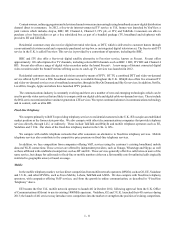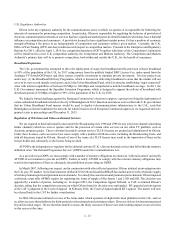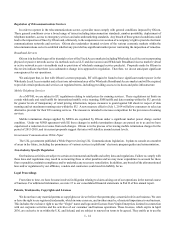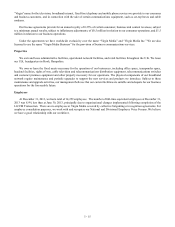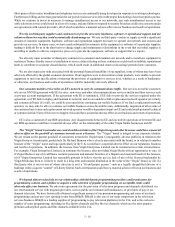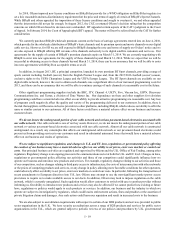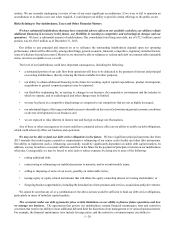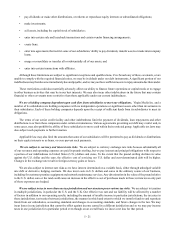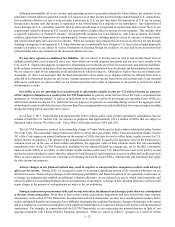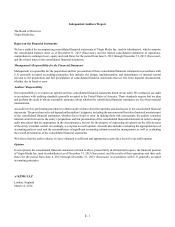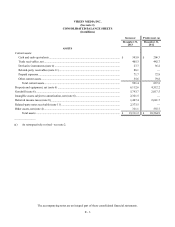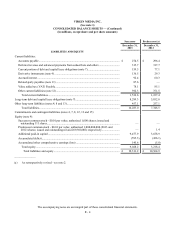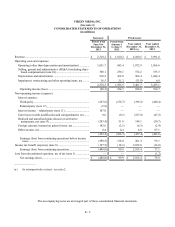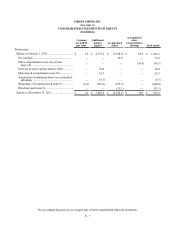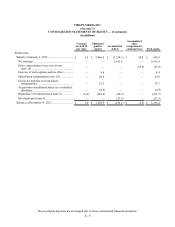Virgin Media 2013 Annual Report Download - page 23
Download and view the complete annual report
Please find page 23 of the 2013 Virgin Media annual report below. You can navigate through the pages in the report by either clicking on the pages listed below, or by using the keyword search tool below to find specific information within the annual report.I - 21
• pay dividends or make other distributions, or redeem or repurchase equity interests or subordinated obligations;
• make investments;
• sell assets, including the capital stock of subsidiaries;
• enter into certain sale and leaseback transactions and certain vendor financing arrangements;
• create liens;
• enter into agreements that restrict some of our subsidiaries’ ability to pay dividends, transfer assets or make intercompany
loans;
• merge or consolidate or transfer all or substantially all of our assets; and
• enter into certain transactions with affiliates.
Although these limitations are subject to significant exceptions and qualifications, if we breach any of these covenants, or are
unable to comply with the required financial ratios, we may be in default under our debt instruments. A significant portion of our
indebtedness may then become immediately due and payable, and we may not have sufficient assets to repay amounts due thereunder.
These restrictions could also materially adversely affect our ability to finance future operations or capital needs or to engage
in other business activities that may be in our best interests. We may also incur other indebtedness in the future that may contain
financial or other covenants more restrictive than those applicable under our current indebtedness.
We are a holding company dependent upon cash flow from subsidiaries to meet our obligations. Virgin Media Inc. and a
number of its subsidiaries are holding companies with no independent operations or significant assets other than investments in
their subsidiaries. Each of these holding companies depends upon the receipt of sufficient funds from its subsidiaries to meet its
obligations.
The terms of our senior credit facility and other indebtedness limit the payment of dividends, loan repayments and other
distributions to or from these companies under certain circumstances. Various agreements governing our debt may restrict and, in
some cases, may also prohibit the ability of these subsidiaries to move cash within their restricted group. Applicable tax laws may
also subject such payments to further taxation.
Applicable law may also limit the amounts that some of our subsidiaries will be permitted to pay as dividends or distributions
on their equity interests or as loans, or even prevent such payments.
We are subject to currency and interest rate risks. We are subject to currency exchange rate risks because substantially all
of our revenues and operating expenses are paid in pounds sterling, but we pay interest and principal obligations with respect to
a portion of our indebtedness in United States (U.S.) dollars and euros. To the extent that the pound sterling declines in value
against the U.S. dollar and the euro, the effective cost of servicing our U.S. dollar and euro-denominated debt will be higher.
Changes in the exchange rate result in foreign currency gains or losses.
We are also subject to interest rate risks as we have interest determined on a variable basis, either through unhedged variable
rate debt or derivative hedging contracts. We also incur costs in U.S. dollars and euros in the ordinary course of our business,
including for customer premises equipment and network maintenance services. Any deterioration in the value of the pound relative
to the U.S. dollar, euro or the rand could cause an increase in the effective cost of purchases made in these currencies as only part
of these exposures are hedged.
We are subject to tax in more than one tax jurisdiction and our structure poses various tax risks. We are subject to taxation
in multiple jurisdictions, in particular the U.S. and the U.K. Our effective tax rate and tax liability will be affected by a number
of factors in addition to our operating results, including the amount of taxable income in particular jurisdictions, the tax rates in
those jurisdictions, tax treaties between jurisdictions, the manner in which and extent to which we transfer funds to and repatriate
funds from our subsidiaries, accounting standards and changes in accounting standards, and future changes in the law. We may
incur losses in one jurisdiction that cannot be offset against income earned in a different jurisdiction and so we may pay income
taxes in one jurisdiction for a particular period even though on an overall basis we incur a net loss for that period.


